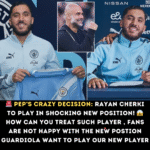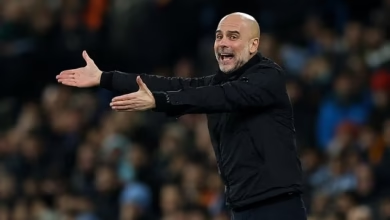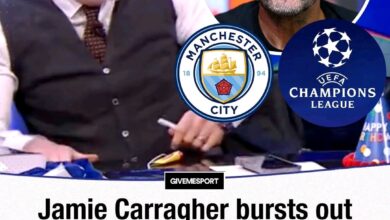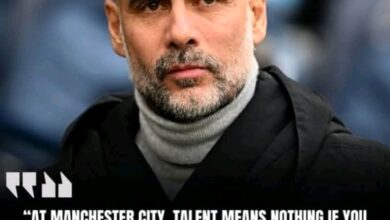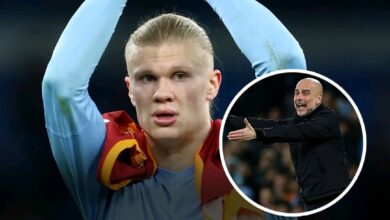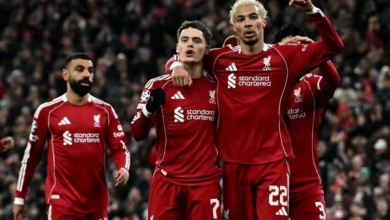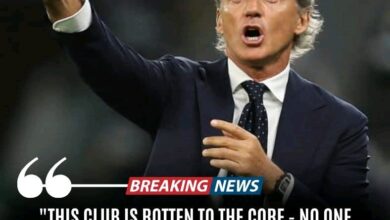Fabrizio Romano names a problem Man City could run into with Rayan Cherki deal
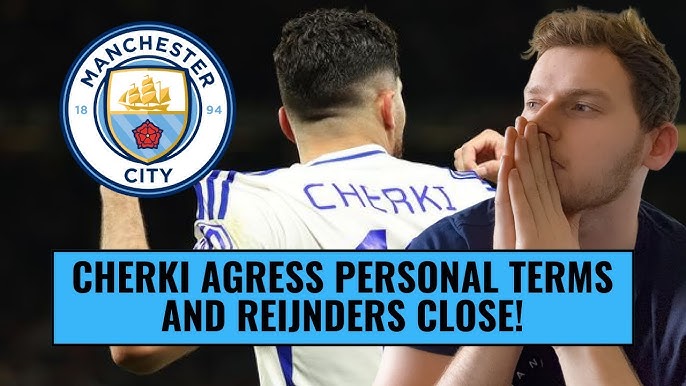
Manchester City finds itself at a pivotal crossroads in its recent history. The impending departure of Kevin De Bruyne, one of the most influential midfielders of the modern era, has created a void that will require both strategic planning and considerable investment to fill. As Pep Guardiola prepares for what many consider his most challenging rebuild at the Etihad Stadium, the club has identified Lyon’s Rayan Cherki as a primary target to help usher in this new chapter.
The 21-year-old French midfielder represents more than just a replacement; he embodies Manchester City’s continued commitment to acquiring young, technically gifted players who can adapt to Guardiola’s demanding tactical system. However, as transfer expert Fabrizio Romano has revealed, City’s pursuit of Cherki is fraught with complications that extend far beyond simple transfer negotiations.
The Kevin De Bruyne Conundrum: An Irreplaceable Legacy
Kevin De Bruyne’s imminent departure represents the end of an era for Manchester City. The Belgian maestro has been the creative heartbeat of Guardiola’s team for nearly a decade, contributing not just goals and assists, but providing the kind of vision and technical excellence that has defined City’s style of play. His ability to thread passes through the tightest of spaces, deliver crosses with pinpoint accuracy, and score crucial goals from midfield has made him one of the most complete players in world football.
Replacing such a player is arguably impossible in the truest sense. De Bruyne’s combination of technical ability, tactical intelligence, and leadership qualities has made him irreplaceable in the conventional understanding of the word. Instead, Manchester City must look to evolve their approach, potentially distributing De Bruyne’s responsibilities across multiple players while identifying individuals who can bring their own unique qualities to the team.
The challenge facing Guardiola and City’s recruitment team is finding players who can not only adapt to the Premier League’s intensity but also possess the technical and mental attributes necessary to thrive in City’s possession-based system. This is where Rayan Cherki enters the equation, representing a different profile of player but one who could potentially offer the creativity and flair that City will desperately need.
Rayan Cherki: The Rising Star from Lyon
Rayan Cherki has emerged as one of French football’s most promising talents over the past few seasons. At just 21 years of age, he has already established himself as a key player for Olympique Lyonnais, demonstrating the kind of technical ability and creativity that has caught the attention of Europe’s elite clubs. His versatility across multiple attacking positions, combined with his excellent dribbling skills and vision, makes him an attractive proposition for teams looking to add creativity to their midfield.
What sets Cherki apart from many of his contemporaries is his ability to operate in tight spaces and create opportunities from seemingly impossible situations. His low center of gravity and exceptional ball control allow him to navigate through congested areas of the pitch, while his passing range and decision-making have shown marked improvement over recent seasons. These attributes align closely with the type of player that typically thrives in Guardiola’s system.
The young Frenchman’s development trajectory has been particularly impressive. Having progressed through Lyon’s youth academy, he has gradually increased his influence on the first team, demonstrating maturity beyond his years in crucial matches. His performances in both domestic and European competitions have showcased his ability to perform on the biggest stages, suggesting he possesses the mental fortitude required to succeed at a club like Manchester City.
The Florian Wirtz Fallout: A Domino Effect
Manchester City’s interest in Cherki can be partially attributed to their failed pursuit of Bayer Leverkusen’s Florian Wirtz. The German international was reportedly Guardiola’s primary target for the creative midfield role, representing what the Spanish coach viewed as the ideal profile for his system. Wirtz’s combination of technical ability, tactical awareness, and Premier League-ready physicality made him an obvious choice for City’s recruitment team.
However, City’s decision to walk away from the Wirtz deal has created a ripple effect throughout their transfer strategy. The reasons behind this withdrawal remain unclear, but it likely involved a combination of factors including transfer fee, personal terms, and competition from other clubs. Whatever the specific circumstances, City’s failure to secure Wirtz has forced them to recalibrate their approach and identify alternative targets.
This setback has elevated the importance of both Cherki and Nottingham Forest’s Morgan Gibbs-White in City’s planning. Both players represent different profiles and would bring distinct qualities to the team, but Cherki’s international experience and proven ability in a top European league may give him an edge in City’s considerations.
The Release Clause Complications: Learning from Dortmund’s Experience
One of the most intriguing aspects of the Cherki situation involves the complexity surrounding his release clause at Lyon. While various reports have suggested the existence of a release clause valued between £20-25 million, Fabrizio Romano’s revelations about Borussia Dortmund’s failed January attempt to trigger this clause have exposed significant complications in the agreement’s structure.
The fact that Dortmund, a club with extensive experience in complex transfer negotiations, was unable to successfully activate Cherki’s release clause suggests that the mechanism contains conditions or stipulations that are not immediately apparent. These complications could involve various factors including timing restrictions, performance-related conditions, or specific circumstances that must be met before the clause becomes active.
This situation creates both opportunities and challenges for Manchester City. On one hand, the complications may deter other potential suitors, reducing competition for Cherki’s signature. On the other hand, City must navigate these same complexities while ensuring they don’t fall into the same trap that ensnared Dortmund during the January transfer window.
Romano’s emphasis on City’s desire to “respect Lyon” and engage in “proper conversation” suggests that the club is taking a more diplomatic approach to the negotiations. Rather than attempting to exploit the release clause, City appears committed to building a positive relationship with Lyon, which could prove beneficial not only for the Cherki deal but for potential future transactions between the clubs.
Manchester City’s Diplomatic Approach: Building Bridges
Manchester City’s strategy in pursuing Cherki demonstrates a mature approach to transfer negotiations that reflects the club’s evolution under Guardiola’s leadership. The emphasis on respecting Lyon and engaging in proper dialogue represents a departure from the more aggressive transfer tactics that have sometimes characterized elite clubs’ pursuit of talent.
This diplomatic approach serves multiple purposes. First, it helps maintain positive relationships with other clubs, which can be crucial for future transfer dealings. Second, it demonstrates professionalism and respect for the player’s current club, which can be important for the player’s own perception of City as a potential destination. Finally, it may actually prove more effective in securing the transfer, as clubs are more likely to negotiate in good faith when they feel respected and valued.
The decision to engage directly with Lyon rather than attempting to exploit the complicated release clause mechanism shows strategic thinking from City’s recruitment team. By acknowledging the complexities involved and choosing to negotiate openly, City may be able to reach a mutually beneficial agreement that satisfies all parties involved.
The Broader Transfer Strategy: A Summer of Change
Manchester City’s pursuit of Cherki forms part of a broader transfer strategy that aims to address multiple areas of the squad during the upcoming summer window. The club’s apparent desire to complete their transfer business early reflects both practical considerations and strategic thinking about the upcoming season.
The practical considerations include Manchester City’s participation in the FIFA Club World Cup in June, which will limit the time available for new signings to integrate with the squad before the start of the new season. By completing transfers early, City can ensure that new players have adequate time to adapt to Guardiola’s system and develop chemistry with their new teammates.
Beyond Cherki, City’s reported interest in AC Milan’s Tijjani Reijnders, Wolves’ Rayan Ait-Nouri, and Newcastle’s Tino Livramento suggests a comprehensive approach to squad strengthening. Each of these players would address specific areas of need within the squad, with Reijnders potentially providing additional midfield depth, Ait-Nouri offering pace and creativity from the left flank, and Livramento adding defensive stability and attacking threat from right-back.
The inclusion of Morgan Gibbs-White from Nottingham Forest as an alternative to Cherki demonstrates City’s thorough approach to recruitment. Gibbs-White’s Premier League experience and proven ability to create chances in English football’s top division make him an attractive option, particularly if complications arise in the Cherki negotiations.
Tactical Considerations: How Cherki Fits Guardiola’s System
Understanding how Rayan Cherki might fit into Pep Guardiola’s tactical system requires analysis of both the player’s attributes and the coach’s preferred approach. Guardiola’s Manchester City typically employs a possession-based system that requires midfielders to be comfortable receiving the ball in tight spaces, capable of playing quick, incisive passes, and intelligent in their movement both with and without the ball.
Cherki’s technical profile aligns well with these requirements. His ability to receive passes under pressure and maintain possession in congested areas would be valuable in Guardiola’s system, where midfielders are often required to play through opposition pressing. His vision and passing range could help unlock defensive opponents, while his dribbling ability would provide an additional dimension to City’s attacking play.
The positional flexibility that Cherki has demonstrated at Lyon could also prove valuable under Guardiola’s management. The Spanish coach often requires his players to be adaptable and capable of playing multiple roles within his system. Cherki’s experience operating as both a central attacking midfielder and in wider positions would give Guardiola tactical options and help address the squad’s need for versatility.
However, there would likely be an adaptation period as Cherki adjusts to the specific demands of Guardiola’s system. The intensity of the Premier League, combined with the tactical complexity of City’s approach, would require time and patience from both the player and the coaching staff.
Financial Implications and Market Dynamics
The financial aspects of Manchester City’s pursuit of Rayan Cherki reflect broader trends in the modern transfer market. The reported £20-25 million valuation for Cherki, if accurate, would represent excellent value for a player of his potential and current ability. However, the complications surrounding his release clause suggest that the actual transfer fee may be higher than initially anticipated.
Manchester City’s financial position allows them to compete for top talent, but the club must also consider Financial Fair Play regulations and the need to balance their squad investment across multiple positions. The early completion of transfer business could help City manage their budget more effectively and avoid the inflated prices that often characterize the latter stages of transfer windows.
The market for creative midfielders has become increasingly competitive, with clubs recognizing the value of players who can provide goals and assists from central positions. Cherki’s age profile makes him particularly attractive, as clubs can expect several years of development and potential resale value in addition to his immediate contribution.
The Competition Factor: Staying Ahead of Rivals
Manchester City’s pursuit of Cherki takes place within the context of intense competition from other elite clubs. The player’s talent and potential have inevitably attracted interest from across Europe, creating a competitive environment that could influence both the transfer fee and the player’s ultimate destination.
The fact that Borussia Dortmund attempted to sign Cherki in January demonstrates the level of interest in the player from clubs with strong track records of developing young talent. Other Premier League clubs are likely to be monitoring the situation closely, potentially ready to enter the race if City’s negotiations encounter difficulties.
City’s advantages in this competition include their proven track record of developing young players under Guardiola’s guidance, the opportunity to compete for major trophies, and the financial resources to offer competitive terms. However, they must also contend with the appeal of other clubs and the player’s own preferences regarding his career development.
The Mbappe Factor: External Validation
The mention of Kylian Mbappe’s previous comments about Cherki adds an interesting dimension to the transfer speculation. High-profile endorsements from established stars can influence both public perception and the player’s own confidence in making a significant career move. Mbappe’s opinion carries particular weight given his status as one of the world’s best players and his experience of high-profile transfers.
Such endorsements can also influence other clubs’ interest in a player, potentially increasing competition and driving up transfer fees. For Manchester City, positive comments from players of Mbappe’s caliber serve as external validation of their recruitment strategy and the quality of players they are targeting.
Integration Challenges and Opportunities
Should Manchester City successfully complete the signing of Rayan Cherki, the club would face the challenge of integrating him into their established squad structure. The departure of Kevin De Bruyne creates an obvious void, but expecting Cherki to immediately fill that role would be unrealistic and potentially counterproductive.
Instead, City would likely need to adopt a gradual integration approach, allowing Cherki to adapt to the Premier League’s intensity while developing his understanding of Guardiola’s tactical requirements. This process would require patience from fans and management alike, as the player establishes himself in new surroundings.
The presence of experienced players like Rodri, Bernardo Silva, and Phil Foden would be crucial in helping Cherki adapt to City’s environment. These players’ experience of Guardiola’s methods and the Premier League’s demands would provide valuable guidance for the young Frenchman.
Long-term Vision and Squad Building
Manchester City’s interest in Cherki reflects a longer-term vision for squad development that extends beyond immediate needs. At 21 years of age, Cherki represents an investment in the club’s future, with the potential to develop into a key player over several seasons.
This approach aligns with City’s broader strategy of combining established stars with promising young talent. The club’s success in developing players like Phil Foden and Rico Lewis demonstrates their ability to nurture young talent within Guardiola’s system, providing a template for how Cherki’s career might develop at the Etihad Stadium.
The financial aspect of this long-term thinking is also significant. Young players with high potential often appreciate in value over time, providing clubs with both sporting success and financial returns on their investment. This consideration makes players like Cherki particularly attractive targets for clubs with strong financial positions.
Conclusion: A Defining Moment for City’s Future
Manchester City’s pursuit of Rayan Cherki represents more than just another transfer negotiation; it symbolizes the club’s approach to a crucial period of transition. The departure of Kevin De Bruyne marks the end of an era, but it also provides an opportunity for the club to evolve and adapt its approach to squad building and tactical development.
The complexities surrounding Cherki’s release clause and the lessons learned from Borussia Dortmund’s failed attempt serve as reminders that modern transfer negotiations require sophistication and patience. City’s diplomatic approach to the situation demonstrates maturity and strategic thinking that could prove beneficial both in securing this particular transfer and in building relationships for future dealings.
The success or failure of City’s pursuit of Cherki will likely have implications beyond this single transfer. It will serve as an indicator of the club’s ability to identify and secure top talent in an increasingly competitive market, while also demonstrating their capacity to adapt their recruitment strategy when faced with unexpected challenges.
As the summer transfer window approaches, Manchester City’s fans will be watching closely to see whether the club can successfully navigate the complexities of the Cherki situation and secure a player who could play a crucial role in their future success. The stakes are high, but the potential rewards – both sporting and strategic – make this a defining moment in the club’s recent history.
The coming weeks will reveal whether Manchester City’s patient and respectful approach to transfer negotiations can overcome the complications that have stymied other clubs. If successful, the signing of Rayan Cherki could represent not just a shrewd piece of business, but a statement of intent for the post-De Bruyne era at the Etihad Stadium.

